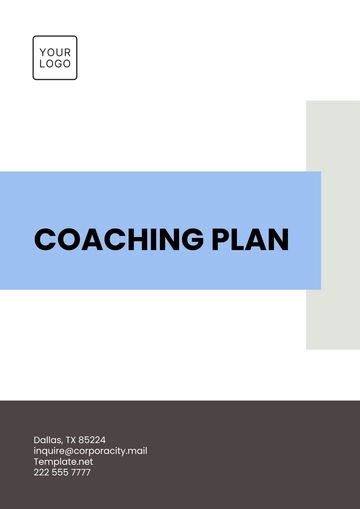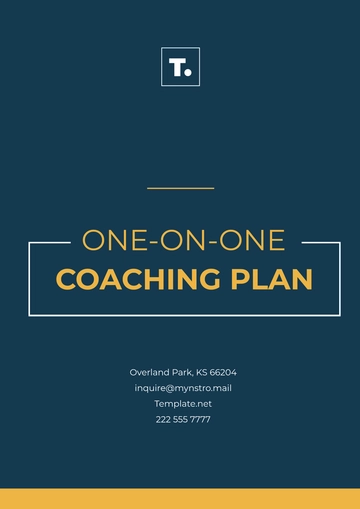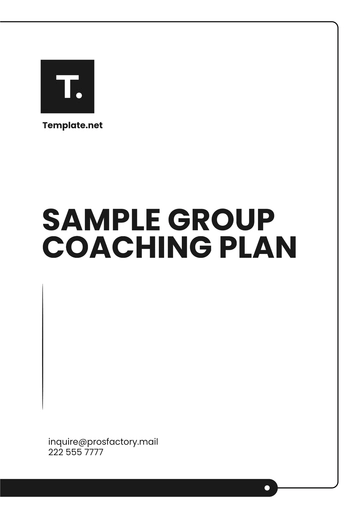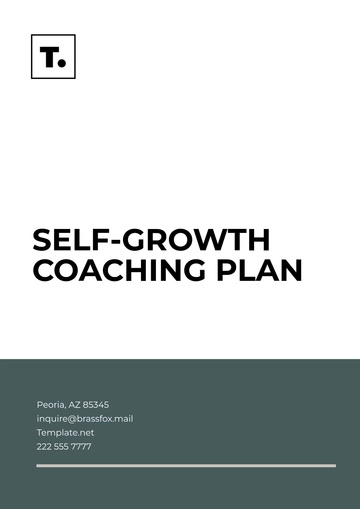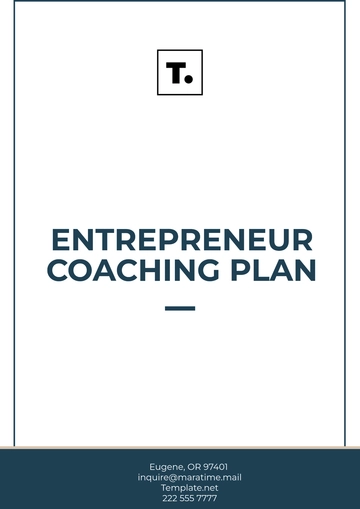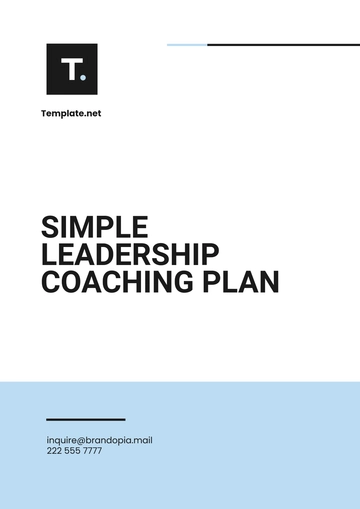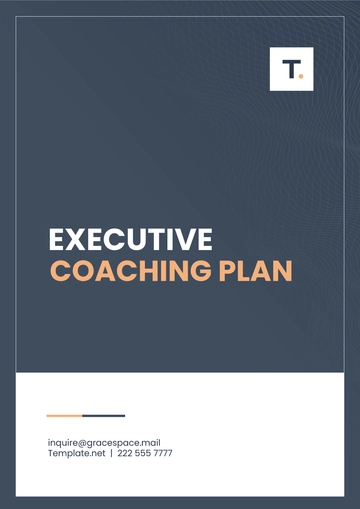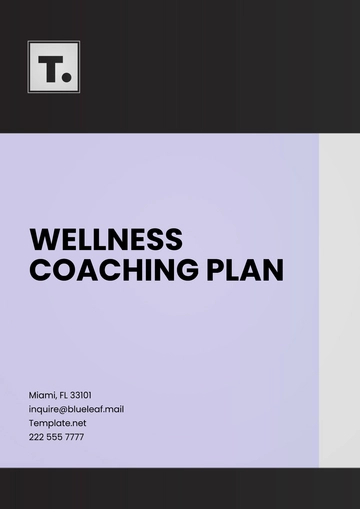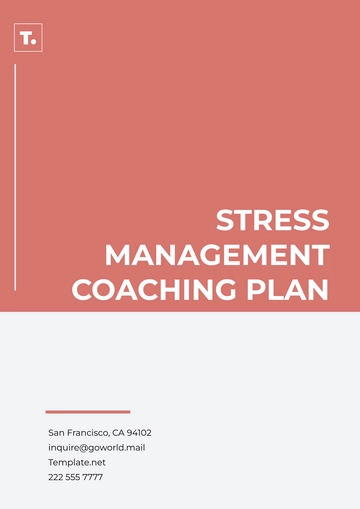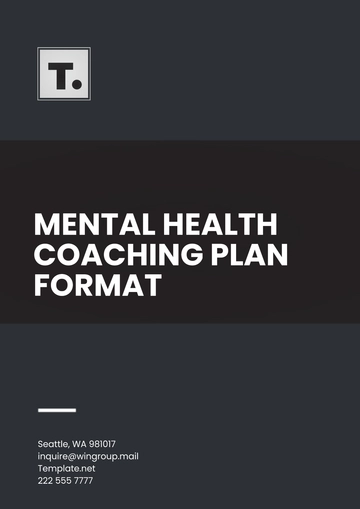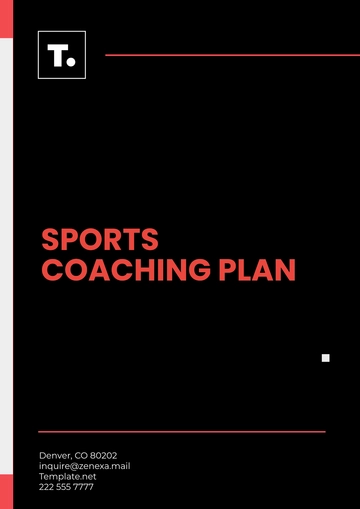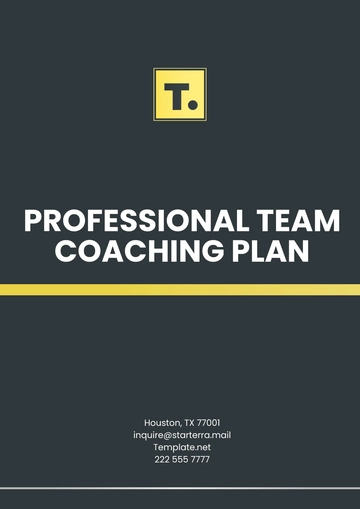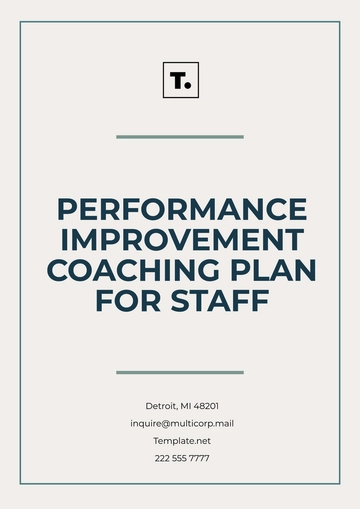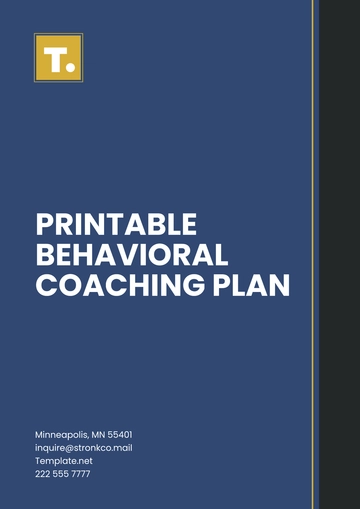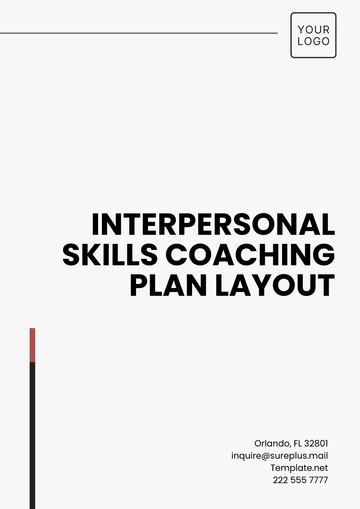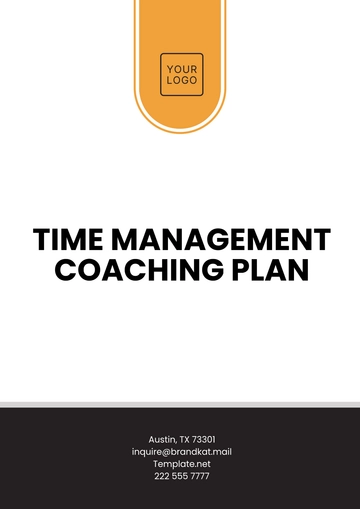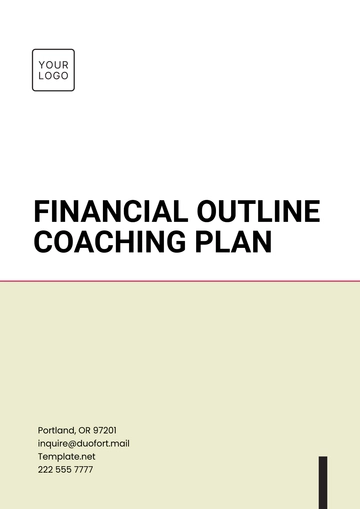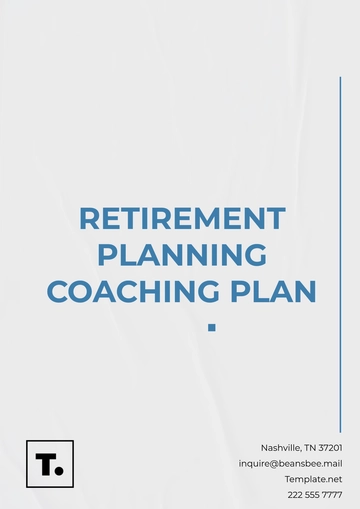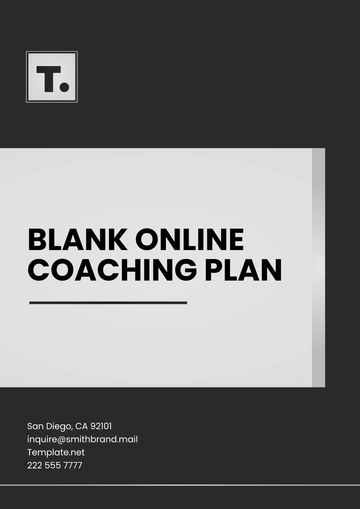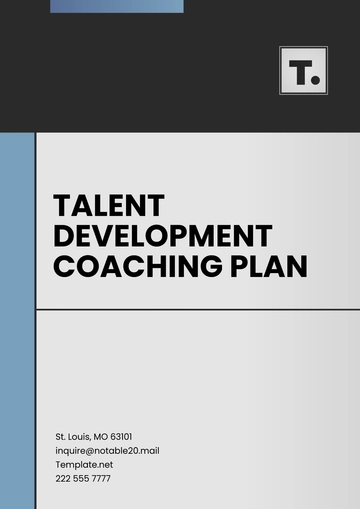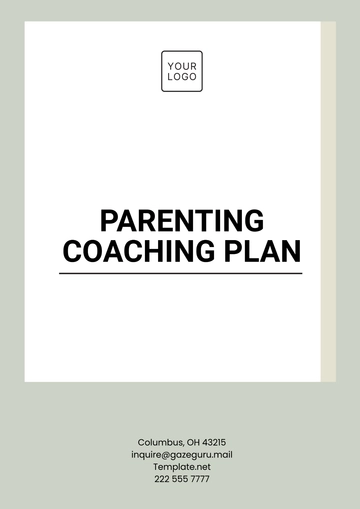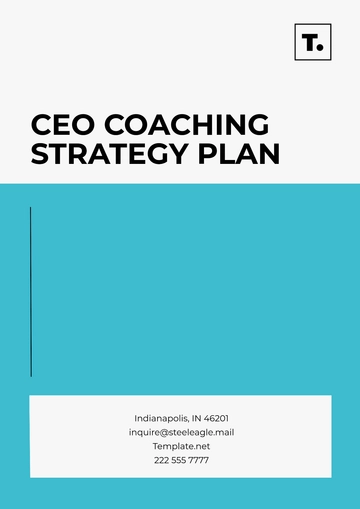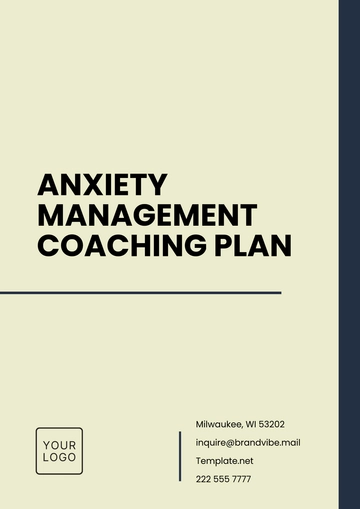Free One-on-One Coaching Plan
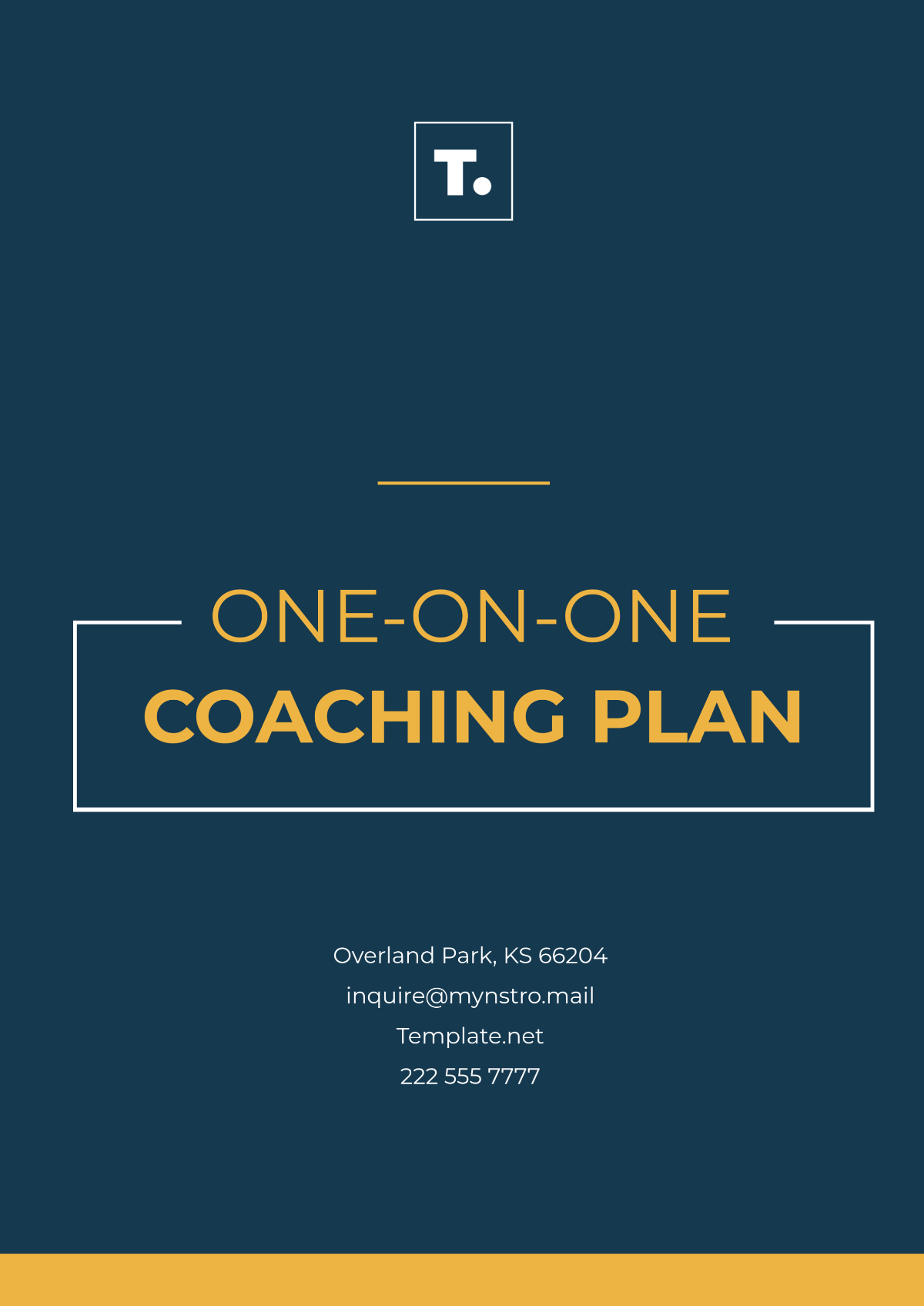
Prepared by: [Your Name]
Date: [Date]
I. Introduction
This coaching plan is designed to provide a clear, actionable, and personalized approach to achieving professional and personal development goals. The coachee will work closely with the coach over 12 weeks to enhance leadership abilities, improve confidence, and address specific challenges. The plan aims to create measurable progress while fostering a supportive and collaborative coaching environment.
II. Goals and Objectives
A. Primary Goal
To transform the coachee into a confident, effective leader capable of handling team dynamics, making sound decisions, and resolving conflicts with poise.
B. Specific Objectives
Build Confidence: Overcome fear of public speaking by practicing presentations and learning audience engagement techniques.
Time Management: Develop strategies for prioritizing tasks, setting realistic deadlines, and maintaining focus during high-pressure situations.
Conflict Resolution: Master practical tools and techniques for addressing interpersonal issues with empathy and professionalism.
Leadership Development: Learn to motivate team members, delegate effectively, and lead by example.
III. Assessment and Current State
A. Current Skills
Proficient in project management tools (e.g., Trello, Microsoft Project).
Strong analytical and problem-solving abilities.
Collaborative team member with good interpersonal relationships.
B. Areas for Improvement
Nervousness during public speaking or addressing large audiences.
Difficulty juggling multiple deadlines and commitments.
Limited experience in managing conflicts among team members.
Hesitation in making decisions independently in high-stakes situations.
IV. Action Plan
A. Strategies
Public Speaking:
Attend a Toastmasters program to practice public speaking.
Review TED Talks and analyze techniques used by influential speakers.
Create and deliver three short presentations during coaching sessions.
Time Management:
Implement the Eisenhower Matrix to categorize tasks by urgency and importance.
Establish a morning routine that includes 10 minutes of daily planning.
Use apps like Todoist or Asana to track and complete daily priorities.
Conflict Resolution:
Role-play conflict scenarios in coaching sessions.
Read “Crucial Conversations” by Patterson et al. and apply key takeaways.
Practice active listening exercises to improve empathy.
Leadership Development:
Participate in team-building workshops.
Delegate a small project to a team and monitor its execution.
Develop a personal leadership philosophy and present it to the coach.
B. Exercises and Tasks
Write and practice delivering a 5-minute speech on a leadership topic by Week 4.
Complete a daily time log for one week to identify time-wasting activities.
Draft a resolution plan for a hypothetical workplace conflict.
Shadow a senior leader in the organization and document key observations.
V. Timeline
A. Duration
12 weeks (one 60-minute session per week).
B. Milestones
Week | Milestone |
|---|---|
Week 2 | Identify specific triggers for nervousness and practice coping strategies. |
Week 4 | Deliver a confident presentation during a mock meeting. |
Week 6 | Demonstrate improved time management through task completion and adherence to deadlines. |
Week 8 | Handle a role-played workplace conflict independently. |
Week 10 | Lead a simulated team-building session effectively. |
Week 12 | Reflect on progress and create a personal action plan for continued growth. |
VI. Resources and Tools
A. Materials
“The 7 Habits of Highly Effective People” by Stephen R. Covey (for time management).
“Leaders Eat Last” by Simon Sinek (for leadership insights).
Online courses on LinkedIn Learning related to leadership and public speaking.
B. Tools
Google Calendar or Microsoft Outlook for scheduling and reminders.
Presentation software (e.g., PowerPoint, Canva) for creating visuals.
Journaling apps like Evernote to track progress and reflections.
VII. Progress Monitoring and Evaluation
A. Evaluation Criteria
Confidence in Presentations: Ability to deliver a well-structured speech with minimal anxiety.
Improved Productivity: Reduction in missed deadlines and better prioritization of tasks.
Effective Conflict Resolution: Successfully mediate a mock disagreement and propose viable solutions.
Leadership Behavior: Feedback from peers or team members regarding improved leadership qualities.
B. Monitoring Techniques
Weekly check-ins to review completed tasks and discuss challenges.
Regular self-assessments using templates provided by the coach.
Feedback forms were distributed to colleagues to evaluate the real-world application of coaching strategies.
Tracking milestones with a visual progress chart shared during sessions.
VIII. Feedback Mechanism
A. Coach Feedback
The coach will provide constructive feedback during and after each session, focusing on strengths and areas for improvement. A summary report will be shared every four weeks to highlight progress and recommend adjustments.
B. Coachee Feedback
The coachee will share their experiences, including what strategies are working and any obstacles faced. Midway through the plan, the coachee will complete a detailed feedback form to ensure the coaching remains aligned with their needs.
- 100% Customizable, free editor
- Access 1 Million+ Templates, photo’s & graphics
- Download or share as a template
- Click and replace photos, graphics, text, backgrounds
- Resize, crop, AI write & more
- Access advanced editor
Unlock the power of personalized coaching with our One-on-One Coaching Plan Template from Template.net. This editable and customizable template is designed to help coaches structure tailored sessions, track client progress, and set clear goals. Our Ai Editor Tool lets you easily modify every section to fit your unique coaching style. Whether you're a life coach or a professional mentor, this template ensures your coaching process is organized, effective, and adaptable to each client’s needs.
You may also like
- Finance Plan
- Construction Plan
- Sales Plan
- Development Plan
- Career Plan
- Budget Plan
- HR Plan
- Education Plan
- Transition Plan
- Work Plan
- Training Plan
- Communication Plan
- Operation Plan
- Health And Safety Plan
- Strategy Plan
- Professional Development Plan
- Advertising Plan
- Risk Management Plan
- Restaurant Plan
- School Plan
- Nursing Home Patient Care Plan
- Nursing Care Plan
- Plan Event
- Startup Plan
- Social Media Plan
- Staffing Plan
- Annual Plan
- Content Plan
- Payment Plan
- Implementation Plan
- Hotel Plan
- Workout Plan
- Accounting Plan
- Campaign Plan
- Essay Plan
- 30 60 90 Day Plan
- Research Plan
- Recruitment Plan
- 90 Day Plan
- Quarterly Plan
- Emergency Plan
- 5 Year Plan
- Gym Plan
- Personal Plan
- IT and Software Plan
- Treatment Plan
- Real Estate Plan
- Law Firm Plan
- Healthcare Plan
- Improvement Plan
- Media Plan
- 5 Year Business Plan
- Learning Plan
- Marketing Campaign Plan
- Travel Agency Plan
- Cleaning Services Plan
- Interior Design Plan
- Performance Plan
- PR Plan
- Birth Plan
- Life Plan
- SEO Plan
- Disaster Recovery Plan
- Continuity Plan
- Launch Plan
- Legal Plan
- Behavior Plan
- Performance Improvement Plan
- Salon Plan
- Security Plan
- Security Management Plan
- Employee Development Plan
- Quality Plan
- Service Improvement Plan
- Growth Plan
- Incident Response Plan
- Basketball Plan
- Emergency Action Plan
- Product Launch Plan
- Spa Plan
- Employee Training Plan
- Data Analysis Plan
- Employee Action Plan
- Territory Plan
- Audit Plan
- Classroom Plan
- Activity Plan
- Parenting Plan
- Care Plan
- Project Execution Plan
- Exercise Plan
- Internship Plan
- Software Development Plan
- Continuous Improvement Plan
- Leave Plan
- 90 Day Sales Plan
- Advertising Agency Plan
- Employee Transition Plan
- Smart Action Plan
- Workplace Safety Plan
- Behavior Change Plan
- Contingency Plan
- Continuity of Operations Plan
- Health Plan
- Quality Control Plan
- Self Plan
- Sports Development Plan
- Change Management Plan
- Ecommerce Plan
- Personal Financial Plan
- Process Improvement Plan
- 30-60-90 Day Sales Plan
- Crisis Management Plan
- Engagement Plan
- Execution Plan
- Pandemic Plan
- Quality Assurance Plan
- Service Continuity Plan
- Agile Project Plan
- Fundraising Plan
- Job Transition Plan
- Asset Maintenance Plan
- Maintenance Plan
- Software Test Plan
- Staff Training and Development Plan
- 3 Year Plan
- Brand Activation Plan
- Release Plan
- Resource Plan
- Risk Mitigation Plan
- Teacher Plan
- 30 60 90 Day Plan for New Manager
- Food Safety Plan
- Food Truck Plan
- Hiring Plan
- Quality Management Plan
- Wellness Plan
- Behavior Intervention Plan
- Bonus Plan
- Investment Plan
- Maternity Leave Plan
- Pandemic Response Plan
- Succession Planning
- Coaching Plan
- Configuration Management Plan
- Remote Work Plan
- Self Care Plan
- Teaching Plan
- 100-Day Plan
- HACCP Plan
- Student Plan
- Sustainability Plan
- 30 60 90 Day Plan for Interview
- Access Plan
- Site Specific Safety Plan
